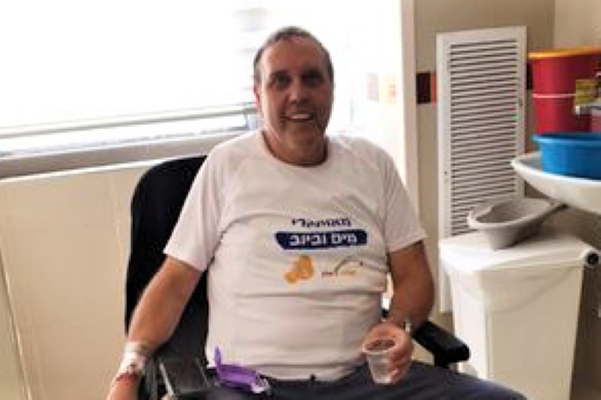“At first, my wife thought I was crazy,” Rony Zigler tells ISRAEL21c, “but as the process went on, she became very supportive.”
By Abigail Klein Leichman, Israel21c
What motivates a person to donate a kidney to save the life of a total stranger?
In Israel, which has the world’s highest rate of altruistic kidney donors, many people make that choice after hearing about a dialysis patient seeking a match or after experiencing a life-changing event.
For Rony Zigler, his decision was inspired by … water filters.
Zigler, 60, is CEO of Kolhei Golan, a company that manages all the sewage treatment plants in the Golan Heights Regional Council.
One of these plants was handling sewage generated by 6,000 people and 6,000 cows – and not doing a great job, given that each cow’s manure output equals that of 150 human beings and is difficult to treat.
A year ago, Kolhei Golan unveiled a new, efficient treatment plant based on technology from NUFiltration in Caesarea.
Zigler learned that NUFiltration’s water filters aren’t made from scratch. They are sterilized, repurposed filters from Israeli kidney dialysis units.
These upcycled filters save lives twice: once by cleansing blood as artificial kidneys and again by cleansing water of pathogens, bacteria, viruses and organic matter.
For the past six years, NUFiltration has been procuring 100,000 used dialysis filters annually.
But that’s only 10 percent of the available supply, NUFiltration CEO Mino Negrin tells ISRAEL21c.
“There are almost 1 million filters used per year in kidney dialysis at Israeli hospitals,” he says.
Answering a huge need
This startling figure motivated Zigler to register with the nonprofit organization Matnat Chaim (Gift of Life), which has facilitated 1,331 live kidney transplants since 2009 from altruistic Israeli donors – people who are not related to their recipients.
Following initial medical tests, Matnat Chaim told Zigler he was a possible match for a Haifa-area resident with the same blood type.
Zigler consented to another few months of testing to assure compatibility and that his own health would not be compromised by donating a kidney.
“At first, my wife thought I was crazy,” Zigler tells ISRAEL21c, “but as the process went on, she became very supportive.”
The surgery was performed in December 2021 at Rambam Healthcare Campus in Haifa, and both donor and recipient are doing well.
The recipient, who does not wish to be identified, is in regular touch with the man who saved his life.
Inspiring others to donate
Zigler says more than a dozen other residents of his hometown of Hispin — a religious Zionist community in the Golan — have donated kidneys through Matnat Chaim.
And his selfless act has inspired others to follow suit.
“My brother-in-law donated a kidney half a year ago because he saw how well I did. And some of my [adult] children also want to donate,” Zigler says, noting that his fast recovery was “nothing compared to orthopedic surgery I had in the past.”
Judy Singer, assistant director of Matnat Chaim (and an altruistic kidney donor herself), tells ISRAEL21c that many potential donors are friends or relatives of past donors, while others are recruited by the organization via social media and other publicity campaigns.
Matnat Chaim has a waiting list of recipients grouped by blood type and prioritized according to a system determined by the organization’s ethics committee.
“Rony’s story is a little unusual,” Singer says, “but people find out about kidney donation in various ways. One woman had horrible accident while hiking and after she had a miraculous recovery she decided as a way of giving back that she’d donate a kidney. And then there was a man whose young son killed himself and he decided to save a life in place of his son.”
As for NUFiltration’s role in this moving story, Negrin says, “This is the first time we’ve encountered someone wanting to donate a kidney [because of their experience with our product], and it’s very nice.”
The company works in many countries and often undertakes emergency humanitarian projects in remote places lacking clean water.



